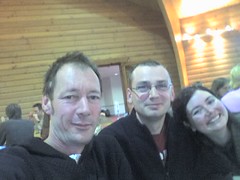
10-04-07_1823.jpeg
Originally uploaded by tallskinnykiwi.
Eating with a couple who live in france. Camp is going really well. Great people.

10-04-07_1823.jpeg
Originally uploaded by tallskinnykiwi.
Eating with a couple who live in france. Camp is going really well. Great people.
It obviously works both ways, or it wouldn’t be such a conundrum. However, I believe we more often forget that all of our theology is contextualized for a particular audience – answering, upholding, correcting various elements of a particular worldview, set of values/beliefs, and behaviors.
Early church councils reflect a critical controversy over the nature of Christ, whereas a contextualized belief statement for the Hmong tribe in Thailand focuses on Christ’s power over evil spirits.
What we often learn quickly is that the Bible has its own various cultures in which the Bible authors communicated. What we sometimes learn if we become missional, is that other people also have a cultural framework through which life and theology is articulated – different from the Bible’s. What very few come to realize is that I/me/we also have a culture that shapes what we care about, how we act, how we approach the Divine, how we relate to others – which is different from either the Bible’s and other’s cultures.
Mission is not direct transmission between the Bible, the Messenger, and the Audience: [B] -> [M] -> [A], but rather: [B] -> (M) -> .
All theology is missional theology.